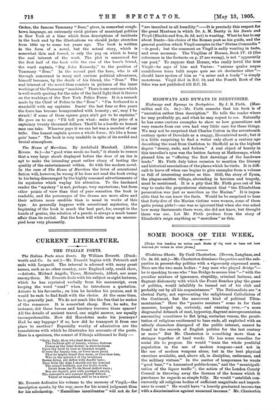CURRENT LITERATURE.
THE ITALIAN POETS.
The Italian Poets since Dante. By William Everett. (Duck- worth and Co. 65. net.)—Mr. Everett begins with Petrarch and onds with Leopardi. The interval is adorned with many great names, such as no other country, save England only, could show, —Ariosto, Michael Angelo, Tasso, Metastasio, Alfieri, are some among them. Mr. Everett deals with his subject in eight lectures, which he has reprinted verbally from his manuscript, even keeping the word "read" when he introduces a quotation. Ariosto is his favourite ; on him he lavishes his praises, and it would be rash to find fault with the choice. At the same time, he is generally just. We do not much like the fun that he makes of the romances. It is somewhat cheap. How, he asks, for instance, did these heroes and heroines traverse these spaces ? All the details of ancient travel, one might answer, are equally incomprehensible. How did Herodotus make his journeys ? Had he any luggage? if so, how did he transport it from one place to another? Especially worthy of admiration are the translations with which he illustrates his accounts of the poets. Here is a specimen, the sonnet of Filicaja addressed to Italy :— °Italy, Italy, thou who haat from fate
The luckless gift of beauty, whence distress Comes as thy fatal dower, in wretchedness Upon thy brow to bear in branded weight, 0 were thy beauty leas, or force more great That he might dread thee more, or love thee less, Who in the splendor of thy loveliness Seems dying, yet defies with deadly hate ; Then from the Alps I should not see descend The armed torrents, nor the Gallic horde Drink from the Po its blood defiled wave ; Nor see thyself, girt with another's sword, The stranger's arin against thyself defend. Victor or vanquished, still to be a slave."
Mr. Everett dedicates his volume to the memory of Virgil,—the inscription speaks, by the way, more for his sound judgment than for his scholarship. " Humillime inseribtuitar " will not, do for
"are inscribed in all humility."—It is precisely this respect for the great Mantuan in which Dr. A. M. Beatty in his Dante and Virgil (Blackie and Son, 2s. 6d. net) is wanting. What he has to say about Dante—his choice of the Roman poet as his guide, and the general position which Virgil occupies in the "Divina Commedia —is good; but the comment on Virgil is sadly wanting in taste, and even accuracy. The Virgilius of Horace, Book IV. 12 (the references in the footnote on p. 27 are wrong), is not "apparently our poet." To suppose that Horace, who really loved the true Virgil—he says of him and Varius : " anima° quales neque candidiores terra tulit neque quis me sit devinctior alter "— should have spoken of him as "a miser and a toady" is simply monstrous. Virgil died in B.C. 19, and the Fourth Book of the Odes was not published till B.C. 13.






































 Previous page
Previous page